The moisture has produced some spectacular cloud formations over our local wetlands, such as these mirrored layers on February 19, 2016:
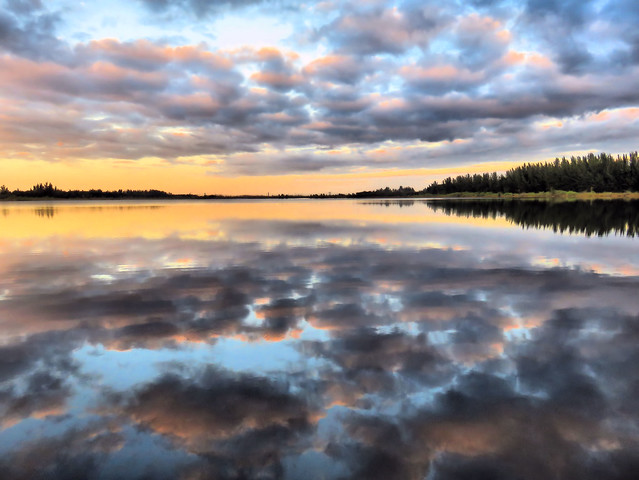
Because prey is diluted into flooded prairies, herons are widely dispersed. The water is generally too deep for Wood Storks, tactile feeders which require greater concentration of prey. Alone on the lake, an immature Little Blue Heron casts a fine reflection (February 20, 2016):
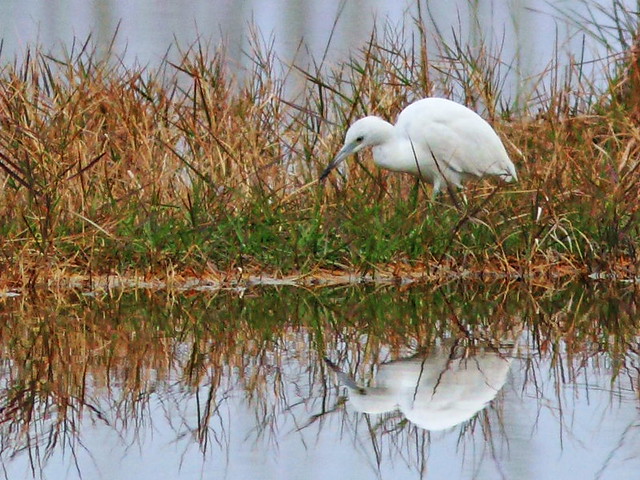
Deer have retreated to higher ground. This yearling White-tailed Deer "button buck" on the levee is the only one I have seen so far this year (February 2, 2016):
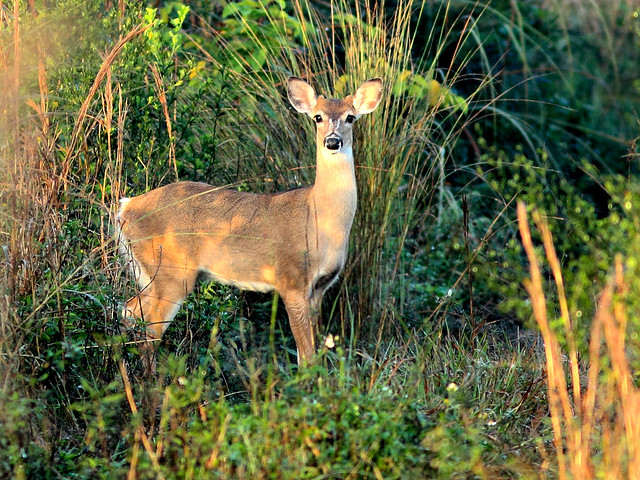
Although I commonly see falcons in our west Miramar (Broward County, Florida) birding patch during the winter, nearly all are American Kestrels. I never tire of photographing this beautiful little raptor. The males have blue wings and those of the larger females are brown.
February 17, 2016:
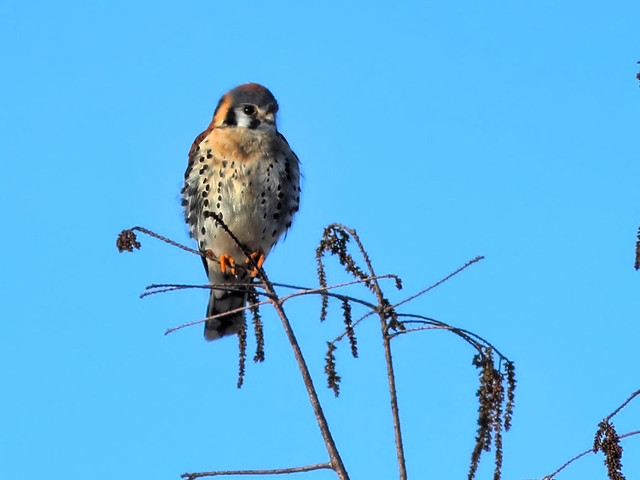
January 9, 2016, perched high atop the emerging leaf spire of a Royal Palm:
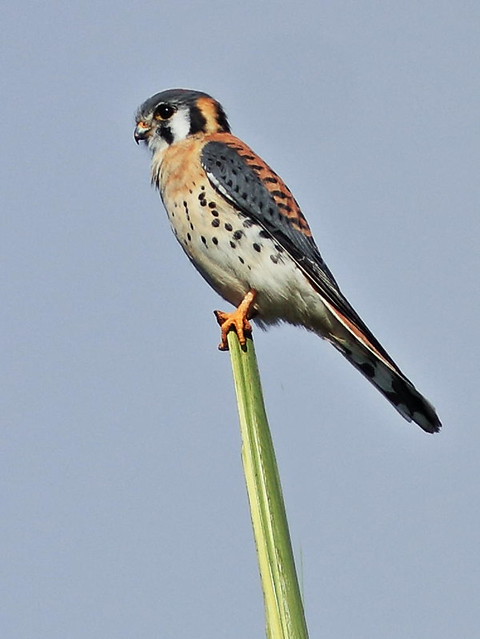
"Kestrel" refers to a species with the habit of hovering into the wind while searching for prey, as this bird is doing June 3, 2015:

Perhaps my favorite photo captured a male preening on a wire, December 7, 2015:
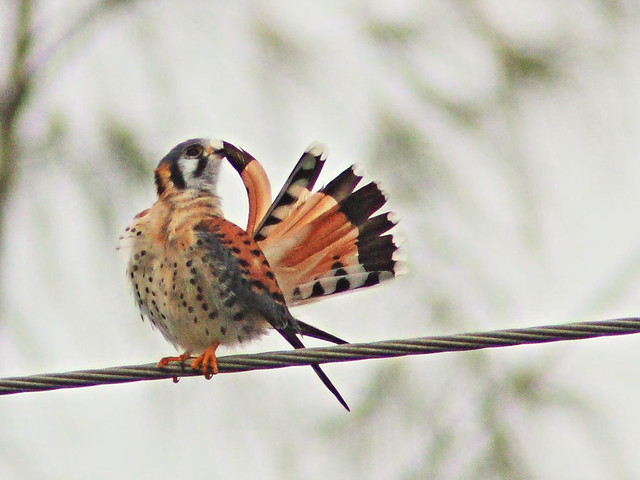
Stretching, a kestrel shows off its bright plumage (December 10, 2010):
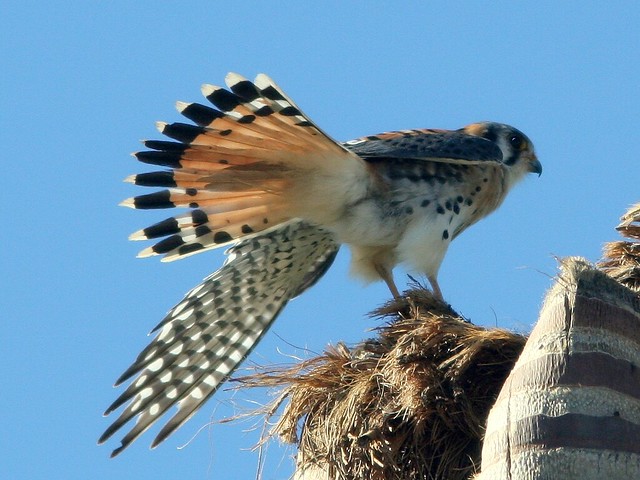
Most of the kestrels I see here are males, as shown in the above photos, but here is one of my few of a female American Kestrel. Kestrels take small birds and rodents but subsist mainly upon insects. She is holding a dragonfly in her talons on March 1, 2014:
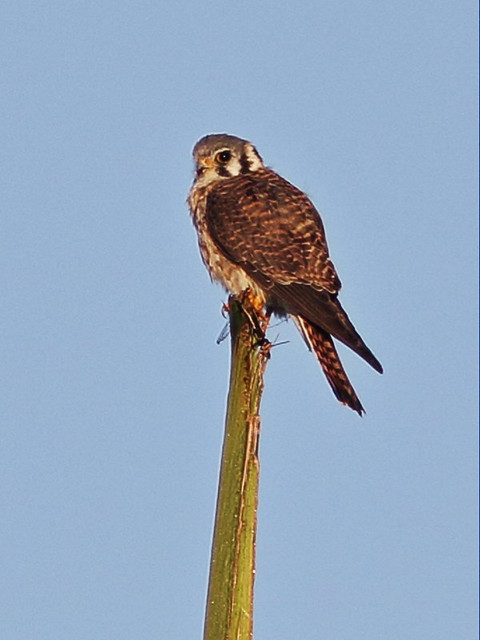
A second species of falcon, the Merlin, appears rarely but regularly every winter. This one caught a small bird and is in the process of plucking its feathers, February 8, 2016:
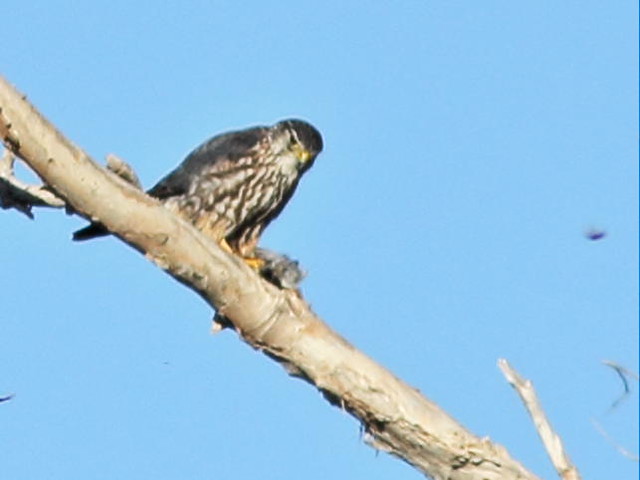
I have found it difficult to get very close to a Merlin, so my photos are mostly of poor quality, as is this one, taken November 17, 2013:

A lucky photo opportunity occurred on December 11, 2008 when a Merlin was sitting on the fence as I drove into the parking lot of nearby Chapel Trail Nature Preserve in Pembroke Pines:
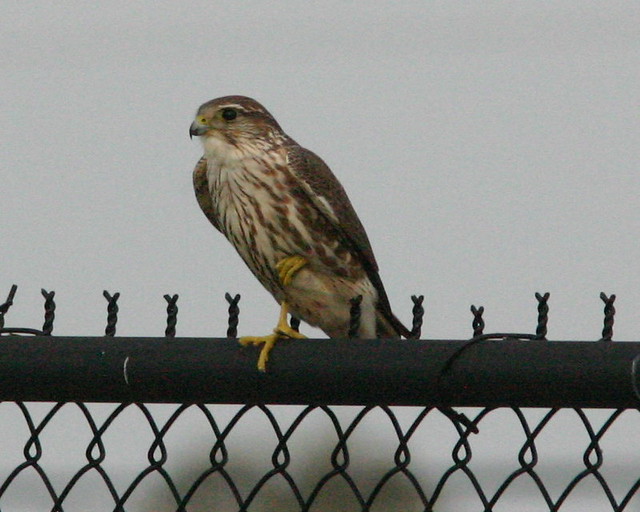
In flight the American Kestrel appears rather light underneath, while the Merlin is usually heavily marked. Merlin in flight, March 21, 2013:

Here a Merlin is in a dramatic confrontation with a Fish Crow (March 28, 2013):

Earlier this winter I saw a large falcon fly over, undoubtedly a Peregrine Falcon, but never got a photo. Then, as I was trying to locate a calling Pileated Woodpecker at the far north end of the wetlands, this large falcon flew in right over my head and briefly settled in a tree only about 100 yards away. I obtained several images in a short burst before it flew off. This is my first image of a local Peregrine, on February 19, 2016:
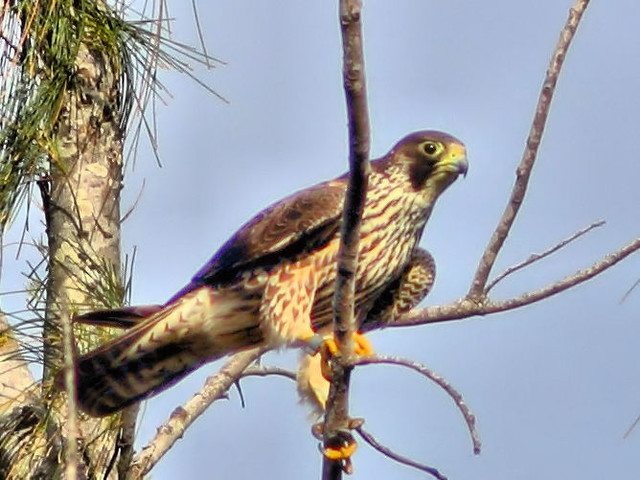
My only other photos of Peregrine Falcons date back to October, 2009 when I last visited Brigantine refuge in New Jersey
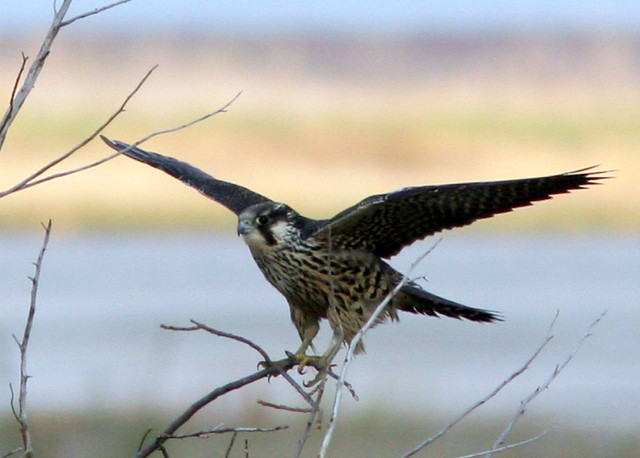
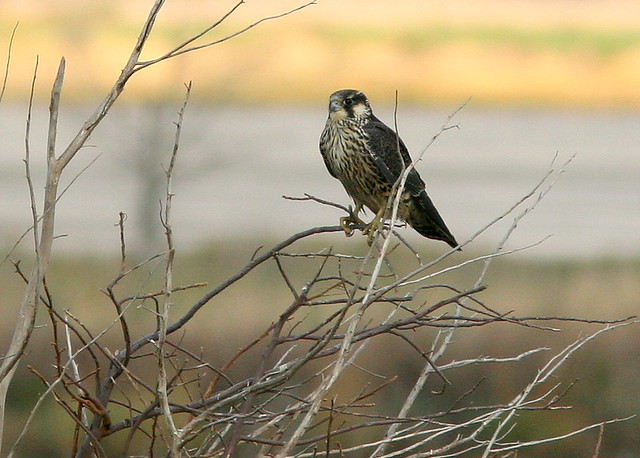
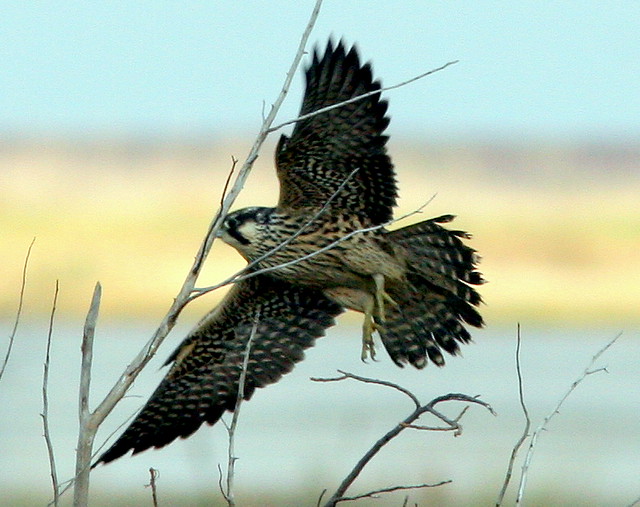
I grew up calling these three falcons Sparrow Hawks, Pigeon Hawks and Duck Hawks. That was their official names when I relied upon my 1939 revision of Roger Tory Peterson's "The Field Guide to the Birds." My mother gifted it to me around 1943 when I was a Cub Scout, after paying $2.75 for it. According to the Inflation Calculator, it cost $37.66 in 2016 dollars, quite a sacrifice in those days.
I made a cover for it out of woodgrain-patterned oil cloth, and despite being exposed to sun and rain as well as a few dunks into swampy water, it has survived to this day:
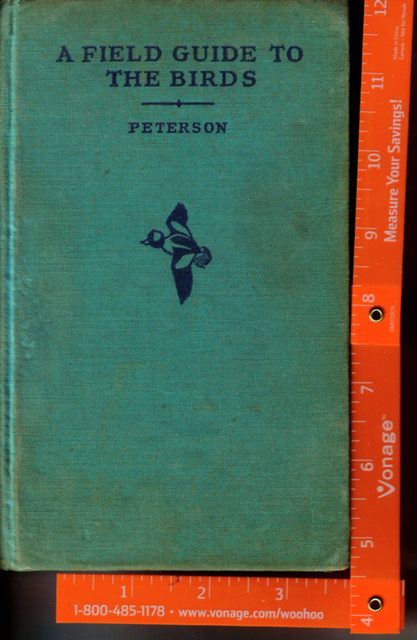

My 1947 edition of Peterson gave the three species new names in parentheses: Kestrel (now properly called American Kestrel), Merlin and Peregrine Falcon, with footnotes to indicate that these were the "Author's preference." This book also looks the worse for wear, as I started keeping a life list for a Boy Scout merit badge in December, 1948. I logged my first "Sparrow Hawk" on February 21, 1949, species #22.
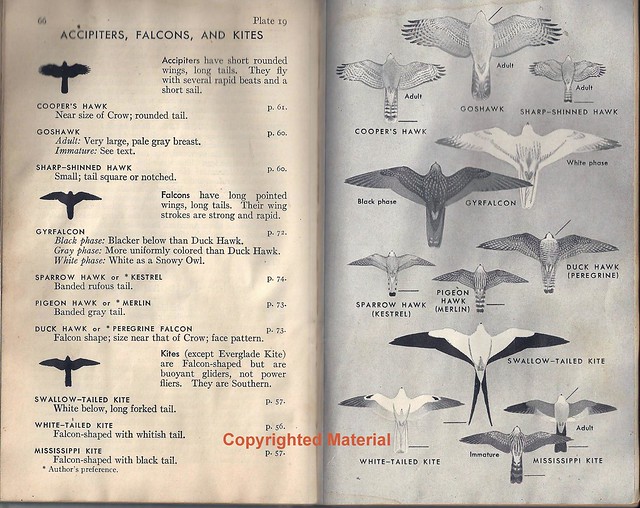
Later I learned that these bird-eating falcons were not true hawks at all. Aside the obvious differences in morphology, they differ from other diurnal raptors in the manner in which they dispatch their prey. Eagles, Buteos and Accipiters "knead" victims with their talons, while falcons kill them with their sharp beaks. The American Kestrel is not closely related to the Common Kestrel of Europe, and indeed may be classified nearer to the Eurasian and Australian hobbies. (Ref: Wikipedia)
= = = = = = = = = = = = = = =
Linking to Misty's CAMERA CRITTERS,
Linking to Eileen's SATURDAY'S CRITTERS,
Linking to GOOD FENCES by Tex (Theresa).
Linking to WEEKEND REFLECTIONS by James
Linking to BirdD'Pot by Anni
Linking to Wild Bird Wednesday by Stewart
________________________________________________
Please visit the links to all these memes to see some excellent photos on display
________________________________________________
Good morning, I love the Kestrels shots. Wonderful birds and photos. Enjoy your day and the weekend ahead!
ReplyDeletegreat shots! love the one of the falcon flying and looking for prey!
ReplyDeletethe peregrine is so cool! loved the kestrel shots!!!
ReplyDeleteThat's a beautiful sky shot to open your series, KCS. And those kestrels are so pretty.
ReplyDelete~
Truly awesome bird and fence sightings.
ReplyDeleteWonderful shots of the Kestrel, such a pretty bird. Also enjoyed seeing the deer.
ReplyDeleteBeautiful pictures of the Kestrel!
ReplyDeleteOh Great work & gorgeous reflection
ReplyDeleteBeautiful sky shot.
ReplyDeleteGorgeous shot of reflection... lovely bird photography too
ReplyDeleteTwinkle Eyed Traveller
Great sky shot, love the kestrel shots, and really interesting that the Peterson Guide dates back that far. I had no idea!
ReplyDeleteYour magnificent photography of nature's gems leave me speechless ~ and especially love the photo of the deer ~ thanks,
ReplyDeleteHappy Weekend to you ^_^
Really beautiful bird captures but the sky and reflection are extraordinary!! A moment you will not soon forget!!
ReplyDeleteSuch amazing shots of Kestrels Kenneth, so much detail. I love the one of the deer too, they have such cute faces.
ReplyDeleteYour book is very precious, how lovely that you still have it.
Thank you for your visit and lovely comments. Have a great weekend :)
Hello Ken, great captures of the falcons and the sky. The deer is pretty too. Thank you for linking up and sharing your post. Have a happy weekend!
ReplyDeleteThat American Kestrel preening is so so cool
ReplyDeleteStunning falcon or kestral photos. A 3 falcon day is a good day in my book.
ReplyDeleteHello Ken!:) So many lovely images, but your first photo is stunningly beautiful. Loved all your Kestral captures, the deer shot, and enjoyed your story about your first bird book. It's wonderful that you still have it in good order after all these years, and learnt so much at an early age about the beautiful raptors you share today.Have a great weekend!:)
ReplyDeletestunning captures
ReplyDeletehttps://jaipurthrumylens.wordpress.com
Three falcon species in south Florida is quite an accomplishment! Wonderful images, Ken! I empathize on getting a good photo of a Merlin. My collection of blurry brown tail feathers is extensive.
ReplyDeleteLove that opening shot!
Outstanding! When I look at the top photo long enough I can almost see the cloud reflections moving on the water.
ReplyDeleteThis is astonishing photography. I will definitely be following you.
ReplyDeleteYour photos are always incredible. I love the flight ones especially. Fabulous!
ReplyDeleteHello Ken. The very wet winter has also played havoc with our wildlife in the UK.
ReplyDeleteA very fine set of images, particularly the American Kestrel and Peregrine. I'm looking forward to catching up with 3 (European)Falcons at the coast tomorrow ... high winds permitting!
I totally enjoyed this post...I love the American Kestrel...I think they are so beautiful and have never even gotten a half decent shot.
ReplyDeleteOh, and that sky/water shot is so, so beautiful.
Such an interesting read. Your own book...a wonderful array of birds, all beautiful images I might add. And the reflection of the egret...superior.
ReplyDeleteI especially loved viewing the flight of the kestrel and the encounter with the crow.
But, as always, fabulous job Ken. Thank you so very much for sharing this post on I'd Rather B Birdin' for the week. Much appreciated.
Your kestrel images are AMAZING! Wow...just stunning! Love all your photos, always. And I always learn so much too. Great post!
ReplyDeleteThe American Kestrel is one in a million, well photographed Ken.
ReplyDeleteI three falcon day is a good day! And the shots of the Kestrel are great.
ReplyDeleteCheers - Stewart M - Melbourne
I remember thinking how wonderful that gift was in your earlier post about that book and how your amazing birding 'career' began. Loved it even more this time because so interesting how the names evolved ...
ReplyDeleteThese are such wonderful photos and it's great that you've spotted the rarer birds, but that series on the Kestral is so amazing... You caught all the behaviors so beautifully. So much better than any bird book could do.
you've got both great sky and reflection there... and a lot of collections of beautiful snapshots of different kind of birds and other animals...
ReplyDeleteGreat field notes and finds. Especially the Merlin. That is always a favorite of mine. Nice outdoor experiences. Hope you have a wonderful week out.
ReplyDeleteHow interesting how the names have evolved over time. Fabulous shots of the Kestrel! I've been blessed to have one around here since about last October. I love to watch his aerial antics! Great shots of the others as well. Raptors are tricky birds to capture. Nicely done!
ReplyDeleteSo great photos of kestrels!
ReplyDeleteLovely collection of photos! I love the photos of the kestrels.
ReplyDeletePrecious.
ReplyDelete